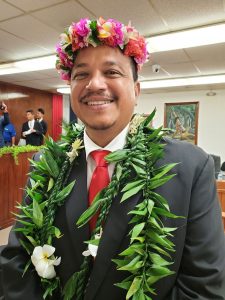Hofschneider pushes creation of a CNMI Term Pension Plan
Sen. Jude U. Hofschneider (R-Tinian) has introduced a bill that seeks to create a CNMI Term Pension Plan intended to benefit government employees who were prior members of the government retirement’s Defined Benefit Plan.
Hofschneider stated in his Senate Bill 23-01 that prior members of the Defined Benefit Plan voluntarily withdrew from the plan since 2013 to save the CNMI government from bankruptcy and the retirees from losing their retirement benefits.
Hofschneider pre-filed the bill during their inauguration day last Monday, making him the first senator in the 23rd Senate to introduce a legislation. The bill is a “recycled” legislation as he introduced it in the 22nd Legislature when he was the Senate president.
The bill proposes to amend Title I, Division 8, Part 3 of the Commonwealth Code by adding a new chapter 13, the CNMI Term Pension Plan, in order to provide a short term retirement security benefit.
Under the legislation, the minimum retirement age is established at age 55 and that term pension is offered at a shortened period of 15 years not to exceed age 70 and terminates upon the death of the annuitant, whichever comes first.
Term Pension uses a predetermined fixed formula to calculate the amount of an employee’s future benefit.
Hofschneider said the DBP has been closed to new employees and a majority of government employees have withdrawn from the plan in order to protect the retirees’ benefits and the CNMI government from bankruptcy.
Today, the only retirement program offered by the CNMI government is a voluntary defined contribution plan, which Hofschneider believes is inadequate to provide for the retirement needs of government employees.
Hofschneider recognized that active government employees who voluntarily withdrew from the DBP to protect the retirees’ benefits and the CNMI government’s solvency lost their right to withdraw the government’s employer contributions to keep the DBP afloat.
He said at that time, the employer contributions of 37.39% was a substantial amount and a financial loss to those active government employees that withdrew from the DBP.
Hofschneider acknowledged the CNMI government resolved its obligations to the retirees in the DBP through an agreement with the NMI Settlement Fund.
He noted that the settlement agreement’s primary purpose was to guarantee that the government retirees received at least 75% of their existing retirement benefits.
The senator said in consideration and in all fairness for those active government employees who sacrificed their future retirement benefits for the continuity of retirement payments to existing retirees in the DBP, his legislation proposes to create a CNMI Term Pension Plan for employees of the executive, legislative, and judicial branches of the government.
He said in addition to employee contributions and budget allocations, additional funds can be collected and deposited into the CNMI Term Pension Plan from the government’s right to collect deficient employer contributions for all employers, including all government public corporations and autonomous agencies pursuant to a provision of the settlement agreement.
The senator said the Legislature may further appropriate funds necessary to implement and administer the CNMI Term Pension Plan.
























